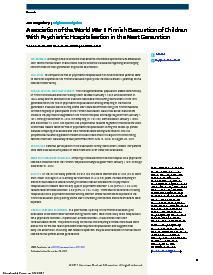Association of the World War II finnish evacuation of children with psychiatric hospitalization in the next generation
IMPORTANCE
Although there is evidence that adverse childhood experiences are associated with worse mental health in adulthood, scarce evidence is available regarding an emerging concern that the next generation might also be affected.
OBJECTIVE
To compare the risk of psychiatric hospitalization in cousins whose parents were vs were not exposed to the Finnish evacuation policy that involved a mean 2-year stay with a Swedish foster family.
DESIGN, SETTING, AND PARTICIPANTS
This multigenerational, population-based cohort study of Finnish individuals and their siblings born between January 1, 1933, and December 31, 1944, analyzed the association of evacuee status as a child duringWorldWar II in the first generation with the risk of psychiatric hospitalization among offspring in the second generation. Evacuee status duringWorldWar II was determined using the Finnish National Archive’s registry of participants in the Finnish evacuation. Data on evacuee status were linked to the psychiatric diagnoses in the Finnish Hospital Discharge Register from January 1, 1971, through December 31, 2012, for offspring (n = 93 391) born between January 1, 1950, and December 31, 2010. Sex-specific Cox proportional hazards regression models were used to estimate hazard ratios for risk of psychiatric hospitalization during the follow-up period. Because offspring of evacuees and their nonevacuated siblings are cousins, the Cox proportional hazards regression models included fixed effects to adjust for confounding factors in families. Data analysis was performed from June 15, 2016, to August 26, 2017.
EXPOSURES
Parental participation in the evacuation duringWorldWar II (coded 1 for parents who were evacuated and placed in foster care and 0 for those not evacuated).
MAIN OUTCOMES AND MEASURES
Offspring’s initial admission to the hospital for a psychiatric disorder, obtained from the Finnish Hospital Discharge Register from January 1, 1971, through December 31, 2012.
RESULTS
Of the 93 391 study persons, 45 955 (49.2%) were women and 47 436 (50.8) were men; mean (SD) age in 2012 among survivors was 45.4 (6.58) years. Female offspring of mothers evacuated to Sweden during childhood had an elevated risk of psychiatric hospitalization (hazard ratio for any type of psychiatric disorder: 2.04 [95%CI, 1.04-4.01]; hazard ratio for mood disorder: 4.68 [95%CI, 1.92-11.42]). There was no excess risk of being hospitalized for a psychiatric disorder among women whose fathers were exposed to the Finnish evacuation policy duringWorldWar II or among men whose mothers or fathers were exposed.
CONCLUSIONS AND RELEVANCE
In a prior follow-up study of the Finnish evacuees, girls evacuated to Swedish foster families duringWorldWar II were more likely to be hospitalized for a psychiatric disorder—in particular, a mood disorder—in adulthood than their nonevacuated sisters. The present study found that the offspring of these individuals were also at risk for mental health problems that required hospitalization and suggests that early-life adversities, including war-related exposures, may be associated with mental health disorders that persist across generations.
Geachte bezoeker,
De informatie die u nu opvraagt, kan door psychotraumanet niet aan u worden getoond. Dit kan verschillende redenen hebben,
waarvan (bescherming van het) auteursrecht de meeste voorkomende is. Wanneer het mogelijk is om u door te verwijzen naar de bron
van deze informatie, dan ziet u hier onder een link naar die plek.
Als er geen link staat, kunt u contact opnemen met de bibliotheek,
die u verder op weg kan helpen.
Met vriendelijke groet,
Het psychotraumanet-team.
In: JAMA Psychiatry, eISSN 2168-622X | 75 | 1 | January | 21-27
http://doi.org/10.1001/jamapsychiatry.2017.3511


